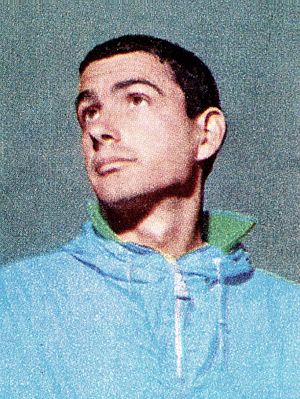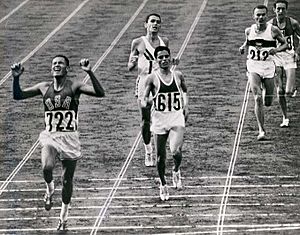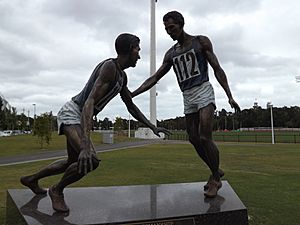Ron Clarke facts for kids
Quick facts for kids
Ron Clarke
|
|||||||||||||||||||||||||||||||||||||||||||||||||
|---|---|---|---|---|---|---|---|---|---|---|---|---|---|---|---|---|---|---|---|---|---|---|---|---|---|---|---|---|---|---|---|---|---|---|---|---|---|---|---|---|---|---|---|---|---|---|---|---|---|
 |
|||||||||||||||||||||||||||||||||||||||||||||||||
| Mayor of the Gold Coast | |||||||||||||||||||||||||||||||||||||||||||||||||
| In office 25 March 2004 – 27 February 2012 |
|||||||||||||||||||||||||||||||||||||||||||||||||
| Deputy | Daphne McDonald | ||||||||||||||||||||||||||||||||||||||||||||||||
| Preceded by | Gary Baildon | ||||||||||||||||||||||||||||||||||||||||||||||||
| Personal details | |||||||||||||||||||||||||||||||||||||||||||||||||
| Born |
Ronald William Clarke
21 February 1937 Melbourne, Victoria, Australia |
||||||||||||||||||||||||||||||||||||||||||||||||
| Died | 17 June 2015 (aged 78) Southport, Queensland, Australia |
||||||||||||||||||||||||||||||||||||||||||||||||
| Political party | Independent | ||||||||||||||||||||||||||||||||||||||||||||||||
| Spouse | Helen Clarke | ||||||||||||||||||||||||||||||||||||||||||||||||
| Occupation | Athlete | ||||||||||||||||||||||||||||||||||||||||||||||||
|
|||||||||||||||||||||||||||||||||||||||||||||||||
Ronald William Clarke (born 21 February 1937 – died 17 June 2015) was a famous Australian athlete and writer. He was also the Mayor of the Gold Coast in Australia from 2004 to 2012. Ron Clarke was one of the best middle- and long-distance runners in the 1960s. He was known for setting an amazing seventeen world records in running.
Contents
Early Life and Olympic Start
Ron Clarke was born in Melbourne, Victoria, on 21 February 1937. He went to Essendon Primary School, Essendon High School, and Melbourne High School. His brother, Jack Clarke, and father, Tom, played Australian rules football. This is a popular sport in Australia. Ron also became a qualified accountant, which means he was trained to manage money and finances.
In 1956, when Ron was just 19 years old, he had a special role. He was chosen to light the Olympic Flame at the Melbourne Cricket Ground. This happened during the opening ceremony of the 1956 Summer Olympics in Melbourne. It was a big honour for a young athlete.
Amazing Athletic Career
During the 1960s, Ron Clarke was a top runner. He won 9 Australian championships and 12 Victorian track championships. These races ranged from 1500 metres to 6 miles (about 9.6 kilometres).

At the 1964 Summer Olympics in Tokyo, he won a bronze medal in the 10,000-metre race. He was expected to win gold but was surprised by Billy Mills. Even though he never won an Olympic gold medal, another famous runner, Emil Zátopek, gave Ron one of his own gold medals. Ron said this was one of his most special gifts.
At the 1968 Summer Olympics in Mexico City, Ron faced a tough challenge. He collapsed during the 10,000-metre race final. This was due to altitude sickness, which happens when your body struggles with less oxygen at high places. Mexico City is very high up. Even though he trained in the Alps mountains to get used to high altitudes, it wasn't enough. Many African runners were used to running at high altitudes. Ron finished sixth and couldn't remember the last part of the race. He recovered and competed in the 5,000-metre heats a few days later.
Ron also won silver medals at the Commonwealth Games. He won silver in the 3-mile event at the 1962 British Empire and Commonwealth Games. Then, at the 1966 British Empire and Commonwealth Games, he won two more silver medals in the 3-mile and 6-mile events.
In 1965, Ron had an incredible 44-day tour in Europe. He raced 18 times and broke 12 world records! On 10 July, in London, he became the first person to run 3 miles in under 13 minutes. His new world record was 12 minutes and 52.4 seconds. Just four days later, in Oslo, he broke his own 10,000-metre world record. He ran it in 27 minutes and 39.4 seconds, becoming the first person to run that distance in under 28 minutes.
Ron Clarke's World Records
Ron Clarke set many world records during his career. Here are some of his most notable achievements:
| Distance | Time / distance |
Location | Date | Note |
|---|---|---|---|---|
| 5000 m | 13:34.8 | Hobart, Australia | 1965-01-16 | |
| 5000 m | 13:33.6 | Auckland, New Zealand | 1965-02-01 | |
| 5000 m | 13:25.8 | Los Angeles, United States | 1965-06-04 | |
| 5000 m | 13:16.6 | Stockholm, Sweden | 1966-07-05 | |
| 10,000 m | 28:15.6 | Melbourne, Australia | 1963-12-18 | |
| 10,000 m | 27:39.4 | Oslo, Norway | 1965-07-14 | |
| 20,000 m | 59:22.8 | Geelong, Australia | 1965-10-27 | As part of 1-hour world record. |
| 1 hour | 20,232 m | Geelong, Australia | 1965-10-27 | |
| 2 miles | 8:19.8 | Västerås, Sweden | 1967-07-27 | |
| 2 miles | 8:19.6 | London, England | 1968-08-24 | |
| 3 miles | 13:07.6 | Melbourne, Australia | 1964-12-03 | |
| 3 miles | 13:00.4 | Los Angeles, United States | 1965-06-04 | As part of 5000 m world record. |
| 3 miles | 12:52.4 | London, England | 1965-07-10 | |
| 3 miles | 12:50.4 | Stockholm, Sweden | 1966-07-05 | As part of 5000 m world record. |
| 6 miles | 27:17.8 | Melbourne, Australia | 1963-12-18 | |
| 6 miles | 26:47.0 | Oslo, Norway | 1965-07-14 | As part of 10,000 m world record |
| 10 miles | 47:12.8 | Melbourne, Australia | 1965-03-04 |
Political Career
In 2004, Ron Clarke was elected Mayor of the Gold Coast in Gold Coast, Queensland. He won against the previous mayor, Gary Baildon. Ron and his wife, Helen, loved the Gold Coast. They first visited in 1957 and returned almost every year. In 1995, after living abroad for 14 years, they moved there for good.
Ron resigned as Mayor of the Gold Coast on 27 February 2012. He decided to run as an independent candidate for a seat in the Queensland state election. However, he did not win this election.
As Mayor, Ron Clarke played a big part in bringing a new Australian Football League (AFL) team, the Gold Coast Suns, to the Gold Coast. In 2011, he also helped the Gold Coast win the bid to host the 2018 Commonwealth Games.
Awards and Honours
Ron Clarke received many awards and honours for his achievements:
- In 1966, he was made a Member of the Order of the British Empire (MBE) for his service to athletics.
- In 2000, he received the Australian Sports Medal for his important contributions as an athlete.
- In 2001, he was given the Centenary Medal for his excellent work in the eco-tourism industry.
- In 2013, he was appointed an Officer of the Order of Australia (AO). This was for his leadership in local government and charity work, and for promoting athletics.
Other recognitions include:
- 1965 – ABC's Sportsman of the Year
- 1965 – Track & Field News Male Athlete of the Year
- 1965 – BBC Sportsman of the Year – Overseas Personality
- 1985 – He was one of the first people to be included in the Sport Australia Hall of Fame.
- 2000 – He was also one of the first people inducted into the Athletics Australia Hall of Fame.
In 2005, an athletics meet was held in Geelong to celebrate the 40th anniversary of his world records there. This event is now held every year.
In 2006, Ron Clarke was one of the final four runners to carry the Queen's Baton around the MCG stadium. This was during the opening ceremony of the 2006 Commonwealth Games in Melbourne.
Emil Zátopek, a famous Czech runner, greatly respected Ron Clarke. In 1966, Zátopek invited Ron to Czechoslovakia. As a special gift, he gave Ron his own 1952 Olympic 10,000-metre gold medal. He told Ron, "Not out of friendship but because you deserve it."
Death and Tributes
Ron Clarke passed away on 17 June 2015, due to kidney failure. He was in Southport, Queensland. He is survived by his wife, Helen, and his sons, Marcus and Nicolas. His daughter, Monique, sadly died in 2009.
Many important people paid tribute to Ron Clarke after his death. The Prime Minister, Tony Abbott, and the Opposition Leader, Bill Shorten, spoke about him in Parliament. They said that Australia had lost a great person.
Herb Elliott, an Australian Olympic gold medallist, said Ron was a great man who contributed a lot to athletics and public health. John Landy, another famous runner, said Ron inspired Australian distance runners with his amazing feats. Frank Shorter, an Olympic marathon gold medallist, said Ron Clarke was his idol.
See also
 In Spanish: Ron Clarke para niños
In Spanish: Ron Clarke para niños
- Olympic medalists in athletics
- Mayor of the Gold Coast
 | Selma Burke |
 | Pauline Powell Burns |
 | Frederick J. Brown |
 | Robert Blackburn |


